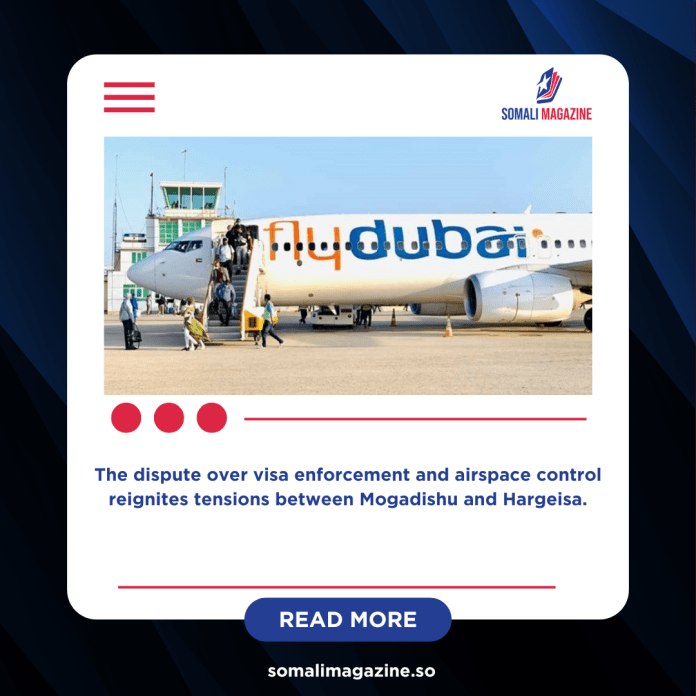Facebook Twitter (X) Instagram Somali Magazine - People's Magazine
The Somali Civil Aviation Authority (SCAA) has issued a warning to Flydubai, urging the airline to strictly follow Somalia’s visa regulations after a passenger arrived in Hargeisa without the required electronic visa (e-Visa). The authority said this incident violated Somalia’s immigration and aviation rules and could pose a threat to the country’s border and national security.
In a letter signed by SCAA Director General Ahmed Moallim Hassan, the agency stated that Flydubai failed to verify the passenger’s visa before the flight, which goes against the country’s entry requirements. The SCAA directed the airline to immediately put in place stronger verification measures to ensure that all travelers flying to Somalia, especially to Hargeisa, have valid Somali e-Visas before boarding.
The authority emphasized that these rules are not just about paperwork but are a matter of national sovereignty and security. It warned Flydubai that failure to comply with the regulations could lead to serious consequences, including fines, suspension of its flights to Hargeisa, or even a review of its operating permit within Somali airspace.
“The passenger brought by Flydubai to Hargeisa did not have the required Somali visa prior to travel, which is a direct violation of the country’s regulations,” the SCAA statement read. The agency called on all airlines operating in Somalia to respect immigration and border control procedures, noting that proper enforcement ensures safety, order, and respect between nations.
In what appears to be a reaction to the growing tension, Somaliland’s Ministry of Civil Aviation and Airports Development released a new directive of its own. The order, effective November 10, 2025, requires all types of civil aircraft — whether scheduled, non-scheduled, or commercial — to apply for overflight permits before entering or passing through Somaliland’s airspace. According to the ministry, the measure is intended to “reflect Somaliland’s full sovereignty over its land, airspace, and seas.”
This development comes amid renewed friction between Somalia’s federal government in Mogadishu and Somaliland authorities in Hargeisa. The disagreement over airspace control and travel regulations is part of a long-standing dispute that dates back more than three decades. Somaliland declared independence from Somalia in 1991 following the fall of Siad Barre’s regime, but no country has officially recognized it as a sovereign state.
Over the years, several rounds of talks have been held to resolve the issue, including meetings in London, Turkey, the United Arab Emirates, and Djibouti. However, despite international mediation, no lasting agreement has been reached. The e-Visa dispute highlights the continued division and how aviation and border management have become arenas for asserting authority.
For travelers, these developments could bring more confusion and stricter travel conditions, particularly for those flying between Somalia and Somaliland. While Mogadishu insists that all international flights landing anywhere in the country must comply with federal visa and immigration rules, Hargeisa continues to operate as an independent authority, managing its own airport and airspace regulations.
Analysts say this standoff may also affect regional cooperation and trade, as air travel remains a vital link for movement of people and goods between Somali cities and neighboring countries. The SCAA’s warning to Flydubai and Somaliland’s subsequent directive both signal growing determination on each side to assert control over airspace and immigration systems — a reflection of the deeper political divide that remains unresolved.
As the November 10 deadline approaches, airlines flying to or over Somaliland are expected to face increased scrutiny and possible policy confusion unless both administrations find common ground. For now, the issue underscores how the question of recognition and sovereignty continues to shape daily governance and the movement of travelers in the Horn of Africa.

